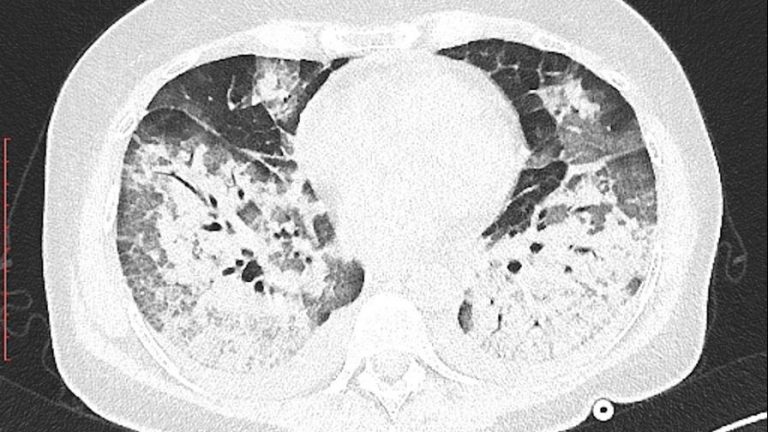
The STOIC project was supported by GE Healthcare, Orange Healthcare and TheraPanacea. These three players will collaborate with AP-HP and the Thoracic Imaging Society. Their objective: to create an unprecedented database on Covid-19 and to develop new tools based on artificial intelligence.
GE Healthcare, Orange Healthcare and TheraPanacea have announced a collaboration with Assistance Publique-Hôpitaux de Paris – AP-HP for a research project to create an unprecedented database for thoracic imaging in patients suspected of being infected with SARS-Cov-2, the virus responsible for Covid-19.
A large-scale study based on the analysis of scans
This collaboration aims to support the STOIC project (ThOracial Scanner for the dIagnosis of Covid-19 pneumonia) led by Professor Marie-Pierre Revel, head of the Cardiothoracic Imaging Unit at Cochin Hospital, a large-scale study that aims to analyse 10,000 chest scans performed for suspicion of Covid-19.
“The interest of the scanner is to identify early signs of the disease and to assess its extent,” explains Professor Revel. “But it also provides other information on the patient’s state of health, pre-existing the infection, making it possible to establish a severity score that can be correlated with the clinical course. All this data is now available and should help us better understand why some individuals develop a severe form of the disease. »
A group of twenty expert radiologists from the Société d’Imagerie Thoracique mobilized on this project is using a web application for 3D image visualization, developed by GE Healthcare on the EDISON ™ platform and deployed by Orange Healthcare via a secure network access and health data hosting infrastructure.
“Cloud hosting services are resilient, scalable and highly secure. They enable the deployment of projects and the management of e-health applications guaranteeing security, business continuity and tailored support, meeting the challenges of the scientific community in terms of the availability and protection of personal health data,” added Eric Pieuchot, director of Orange Healthcare.
This software enables the viewing of 3D images and the remote annotation of lung lesions by bypassing the areas affected by the virus. It also allows them to provide information on vascular, pulmonary or overweight co-morbidity factors that may influence the course of the disease, such as the appearance of arteries, the appearance of unaffected lungs, or the abundance of fat in the chest wall.
Creating new tools based on artificial intelligence
This database will enable the development of artificial intelligence solutions, for example to quickly and automatically quantify the extent and severity of lesions, to guide patient management, or to evaluate the effectiveness of the treatments implemented.
“The promise of artificial intelligence in the field of personalized medicine shows the importance of working in an ecosystem. By pooling expertise, the open and inclusive approach of the STOIC project has made it possible to accelerate a project with high added value, in response to a societal expectation,” explains Baptiste Perrin, R&D Director at GE Healthcare.
Based on the first annotated data collected by the consortium, TheraPanacea has developed a pilot integrating artificial intelligence to quantify the disease and establish a short-term prognosis of patients from their lung scans at hospital entry.
“Artificial intelligence has a crucial role to play in crisis situations such as the one we are experiencing. Artificial intelligence has a crucial role to play in crisis situations such as the one we are experiencing,” explains Professor Nikos Paragios, President of TheraPanacea. “It must be part of the arsenal of doctors and carers to enable them to make the right decisions faster and for more patients, while keeping their critical thinking skills. »
“This health crisis has forced us to mobilize fully and urgently, and no one has counted their time, whether engineers, radiologists, researchers, or project managers managing the regulatory aspects,” emphasizes Professor Revel. “We have discovered models of collaboration that can be replicated for other public health imperatives or emergencies. »
All the data, coming from many public hospitals in Paris, but also from Rennes, Lyon and Strasbourg, will constitute an unprecedented database on Covid-19.
The STOIC project is supported by the patronage of several companies and foundations, all mobilized by the health emergency: Société Innothera, Société Guerbet, Fondation Centrale Supélec, Fondation de l’AP-HP pour la Recherche.
Translated from Covid-19 : Focus sur le projet de recherche STOIC pour créer une base de données inédite et des outils IA









